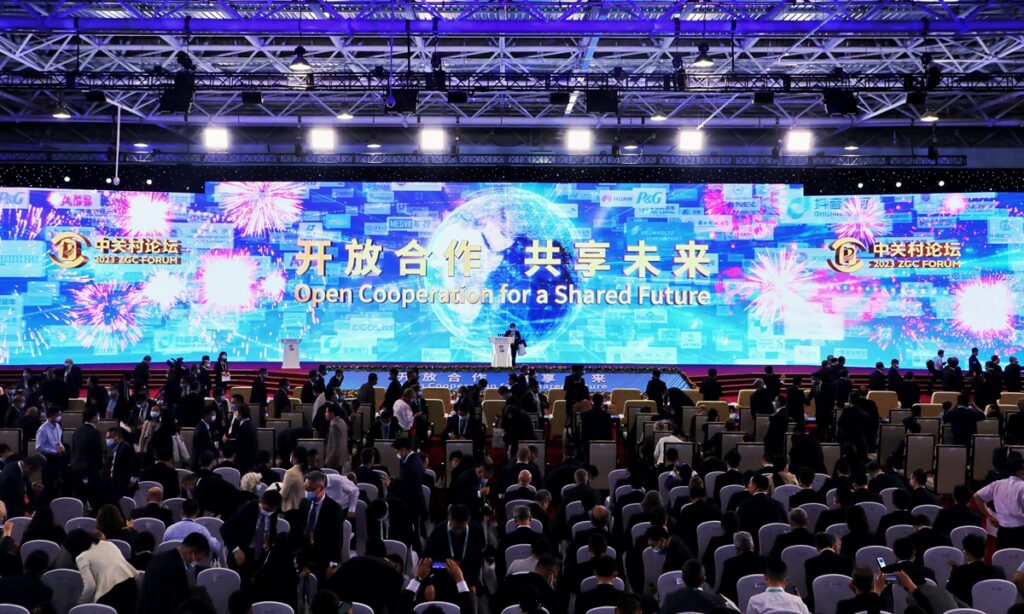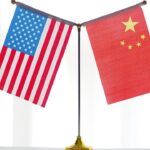President Xi stresses global sci-tech cooperation in letter to major tech forum
The ZGC Forum officially kicked off in Beijing’s Zhongguancun district, known as “China’s Silicon Valley,” on Thursday. The forum, which is scheduled to run from May 25 to 30, will unveil the latest achievements made in a wide range of cutting-edge technologies such as artificial intelligence (AI), quantum science and brain-computer interface, help boost global scientific and technological exchanges and facilitate business cooperation.
Coming as China ramps up efforts to bolster its sci-tech self-reliance and strength and as the US and some of its allies actively push for technological protectionism and even decoupling, the ZGC Forum represents China’s latest concrete efforts to strengthen innovation capabilities at home as well as boost cooperation around the world, experts noted.
Major platform
In the congratulatory letter, Xi noted that at present, a new round of scientific and technological revolutions and industrial transformations is developing deeply and mankind needs international cooperation, openness and sharing more than ever to solve common development challenges.
China unswervingly pursues an open strategy of mutual benefit and win-win results, and is willing to work with all countries around the world to promote scientific and technological innovation and science and technology to better benefit the people of all countries, Xi stressed.
The President also called on Beijing to give full play to its advantages in education, technology and talent to promote technological innovation and systemic innovation.
Launched in 2007, the ZGC Forum has grown into a global, comprehensive, open and high-level international event for enhancing innovations in science and technology. This year, the forum will feature six sections, including conferences, technological transactions, exhibitions and achievement reports. It will focus on frontiers and hot topics such as the digital economy, AI, life and health, and carbon peaking and neutrality.
“The ZGC Forum plays several major roles in promoting technological innovation in China as well as promoting global scientific and technological cooperation,” Wang Peng, a research fellow at the Beijing Academy of Social Sciences, told the Global Times on Thursday, noting that the forum has become a major platform for showcasing breakthroughs in frontier technologies, conducting international exchanges, and facilitating the transfer and transformation of sci-tech achievements.
At the opening ceremony on Thursday night, 10 major sci-tech achievements were unveiled, covering a wide range of areas, including blockchain accelerator chips, semiconductors and quantum computing cloud platforms.
Also, among the highlights of this year’s forum are specific exhibition areas dedicated to different cutting-edge technologies. At the robotics exhibition, various core technologies and components of robots such as chips and sensors will be on display. At the metaverse exhibition area, advanced technologies and products such as virtual reality and augmented reality will be showcased.
The forum, with displays of all the latest achievements in cutting-edge technologies, will offer a clear direction for future innovation, including breakthroughs in core technologies that are subject to foreign restrictions, Wang said.
The ZGC Forum takes place in Beijing’s famed tech district of Zhongguancun, which has become an embodiment of China’s innovation-driven growth and shoulders a significant mission in pursuing national technological advances.
The Zhongguancun National Innovation Demonstration Park, where the forum is held, has played a major role in China’s sci-tech innovation, fostering more and more tech companies. In 2022, the total revenue of all firms in the park reached 8.7 trillion yuan, 3.5 times that of 2012. In Beijing, 293 new tech companies were established each day in 2022, according to Xinhua.
Global profile
Along with such great achievements, the ZGC Forum’s global profile has also risen sharply in recent years, experts noted.
Underscoring its increasing popularity, guests from more than 80 countries and regions, and nearly 200 international organizations and institutions are expected to attend the forum. It has also attracted more than 650 tech companies, including 120 foreign companies and entities, and technological achievements from more than 40 countries and regions will seek cooperation deals, according to official data. About 120 top experts from around the world, including 17 Nobel Prize laureates, will deliver keynote speeches at the forum.
Among the influential international speakers are Daren Tang, director general of the World Intellectual Property Organization, Peter Gluckman, president of the International Science Council and Bill Gates, co-chairman and director of the Bill and Melinda Gates Foundation.
The participation of so many internationally renowned scholars and experts fully demonstrates the growing profile of the forum as well as their recognition of and confidence in China’s openness and the vast potential of the Chinese market, Liu Dingding, a Beijing-based tech industry observer, told the Global Times on Thursday.
“The forum shows China’s commitment to opening wider the door for cooperation and sharing the dividend of sci-tech innovation and the vast Chinese market, even as it tries to bolster its sci-tech self-reliance and strength,” Liu said, “this is a very positive signal for the outside world.”
However, experts are also quick to point out that even as China actively promotes global cooperation in sci-tech innovation, some Western countries led by the US are relentlessly erecting barriers to cooperation and even pushing for a so-called tech decoupling.
The US, in particular, has put more than 1,200 Chinese companies and individuals on various lists and subjected them to all kinds of restrictions. It has imposed various restrictions on tech exports to China, and is reportedly mulling more restrictive actions along with some of its Western allies.
With their participation at the ZGC Forum, many international organizations also fully demonstrated through real action that the US-led West’s push for decoupling, disruption and restriction is unpopular, Wang said.




